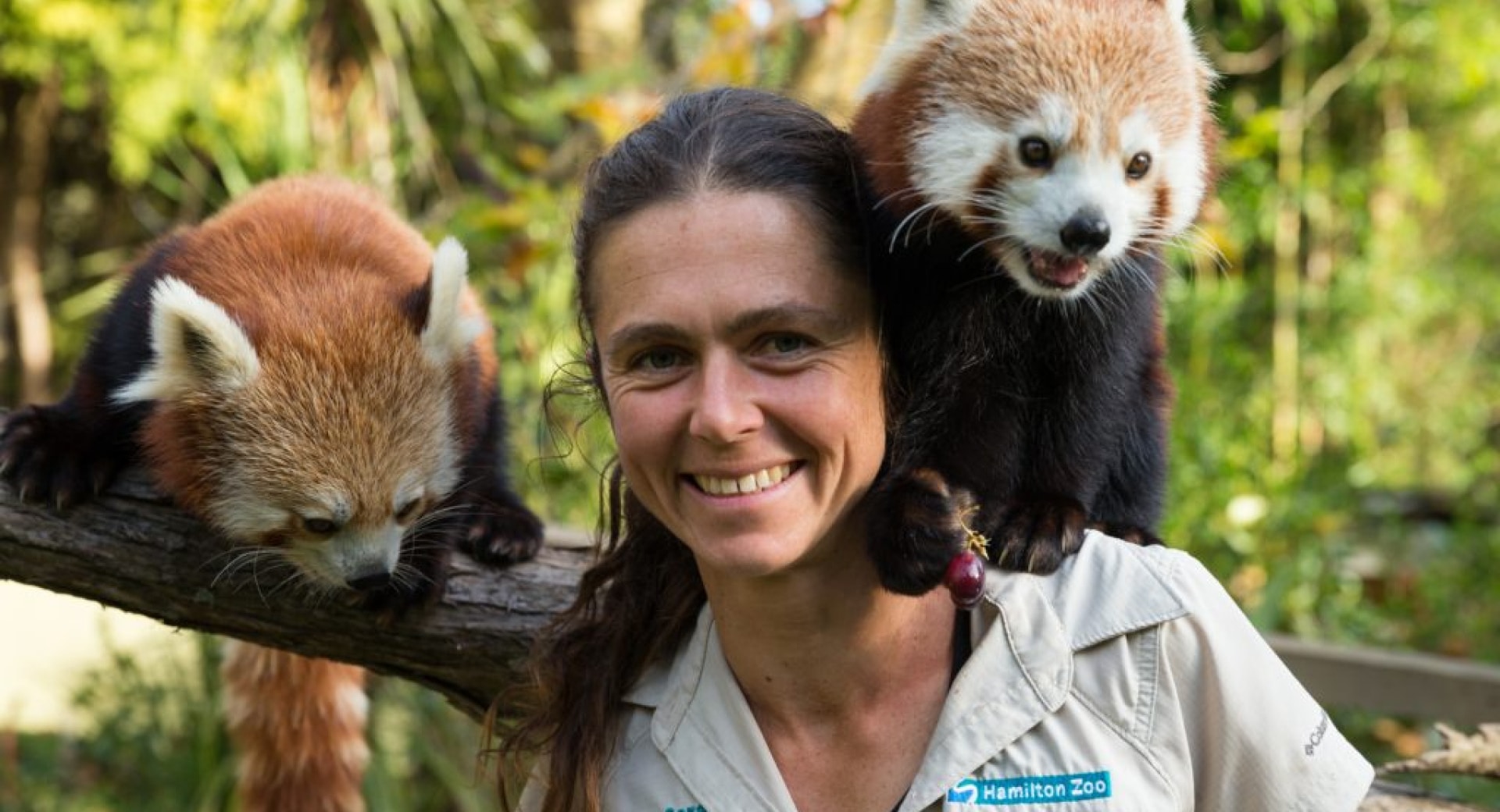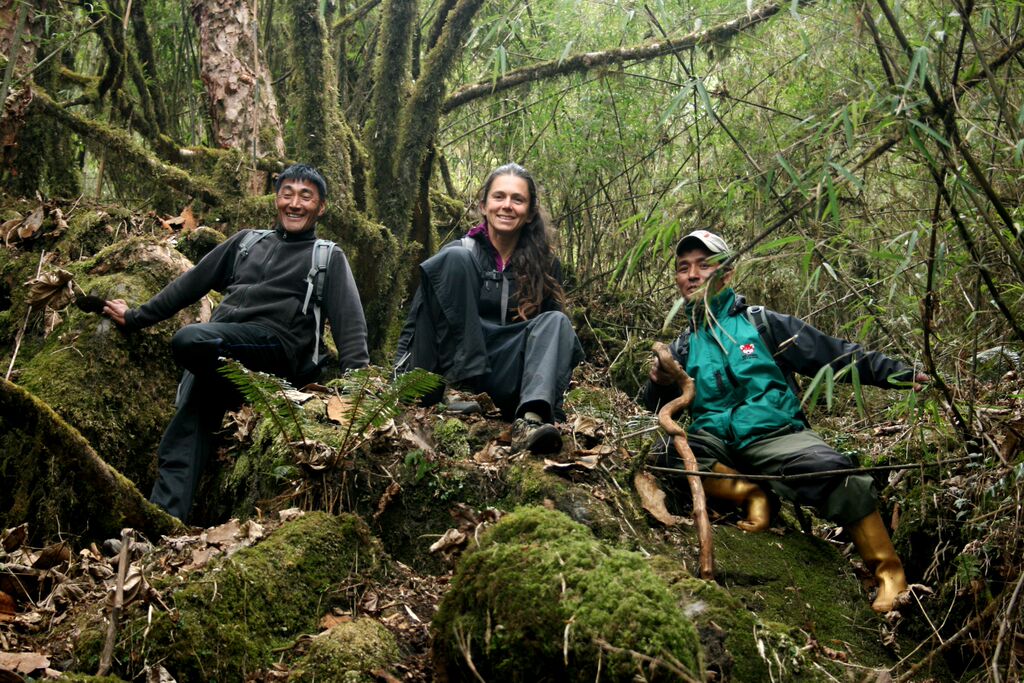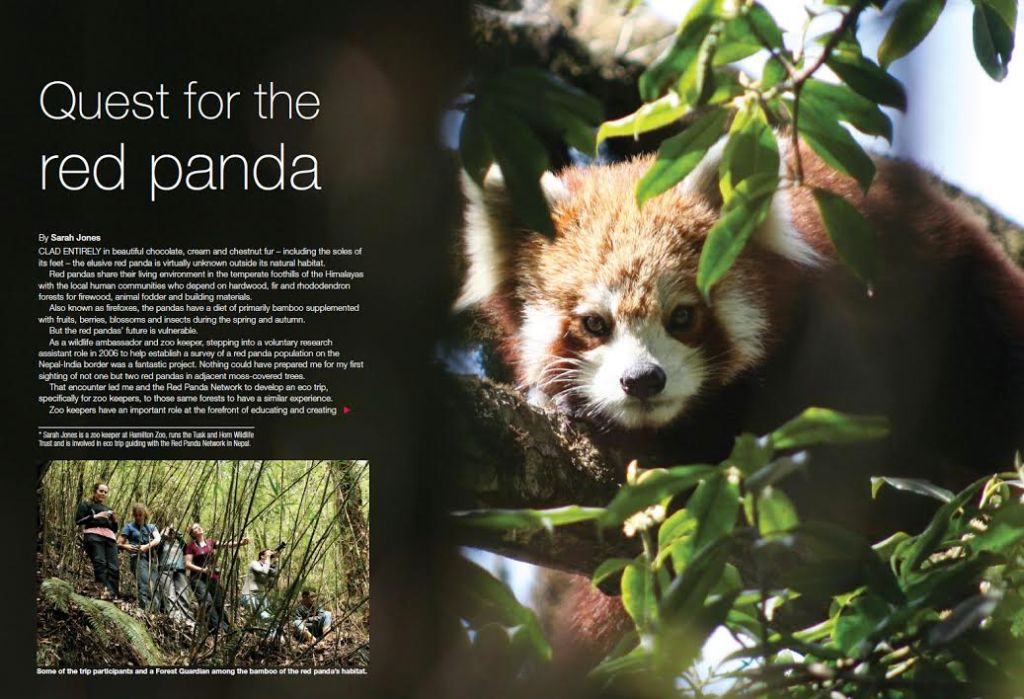
Red Panda ambassador Sarah Jones is a testament to her profession and a blessing for more than one endangered species. A zoo keeper at Red Panda Network (RPN) as an ecotrip guide in Nepal. In March 2015, Sarah led a zookeeper ecotrip for RPN and upon her return, wrote a beautiful article for the ‘Animals Voice’ magazine to further raise awareness for the vulnerable red panda species.
We have been so moved by Sarah’s devotion to red panda conservation that we decided the world needs to know her story and what steps she took to make a difference. Red panda ambassadors everywhere will hopefully find this interview inspiring and useful!
Q: Sarah, what kind of zoo keeper are you and how long have you been with Hamilton Zoo?
A: I’m primarily a large hoofstock keeper, managing the Southern White Rhino, American Plains Bison and Fallow Deer groups we have, but have cared for red panda, carnivores and small mammals over the nine years as a keeper. Six of these years have been with the Hamilton Zoo.
Q: How did you get your start as a zookeeper? What steps did you take?
A: I knew from an early age that my passion for wildlife would also be my career one day. It officially began, we could say, with training in animal care and veterinary assistance, which quickly led to being offered a full-time keeping position at the Auckland Zoo.
Q: Tell us a little about Tusk and Horn and how you went about starting a wildlife trust?
A: Tusk and Horn was founded in 2013 because of my passion for both species and their habitats. Our small team raises awareness and creates education about the African and Asian Elephant and Rhinoceros species for present and future NZ generations. Supportive of two in situ projects in The David Sheldrick Wildlife Trust in Kenya and Saving the Survivors in South Africa who both work in the field with poaching and human wildlife conflict victims.
Q: At what point did you become involved with Red Panda Network?
A: I became involved with RPN in 2006 as a volunteer research assistant with the baseline survey project ‘Punde Kundo’. At this time I was working as a carnivore keeper, which included the red pandas, and was looking to work in the field with a community project.
Q: How did you get involved with guiding eco trips? What qualifications does one need? For example, had you ever led an eco trip before you led the Spring 2015 RPN Zookeepers eco trip in Nepal?

A: Having experienced the forests and the communities living in the red panda habitat in 2006/07, I gained unique insight into their world and wanted to share it with like-minded people. As zoo keepers, we are ambassadors for all nature and I wanted to create that bridge for keepers – by having a true wild experience with red panda sightings and sharing awareness of the red pandas’ vulnerability and RPN’s community-based work with public and zoo visitors on their return home. A keen sense of adventure, my role as a keeper and having worked alongside my husband’s business with rock climbing and caving groups – all of this helped me to develop the skills needed for leading a trip and having fun with anyone and everyone.
Q: Please share with us a little background on the Animals’ Voice publication. Where did it come from and what is its mission?
A: Animals’ Voice is the official publication of SPCA Auckland and New Zealand’s No.1 pet magazine. The magazine is packed full of features and articles about animal care and well being. Over the past few years they have broadened their content with features of exotic species and conservation messages, including the destruction of lush jungles in Indonesia (home to elephant, rhino, tiger, orangutan) to plant palm oil plantations.
Q: How did you come to write an article for Animals’ Voice?

A: I approached Animals Voice in 2011 after a visit to Kenya to meet my heroine Dame Daphne Sheldrick from The David Shedrick Wildlife Trust. Upon my return I wrote an article about their pioneering work rescuing and hand-rearing orphaned elephant and rhino calves and the magazine published it. So when I spoke to them after the last eco trip they were excited and welcoming of the Quest for Red Panda piece I had written.
Q: What are your plans for the next RPN zookeeper eco trip? Will you do the same thing or try something new? What are your goals?

A: The next RPN Zooekeeper Eco Trip will be very much the same, with the important addition of immersing ourselves in cooking classes within the local communities. We will shop for fresh produce at local markets and learn how to prepare simple and nutritious food Nepali style, which will be great as everyone loves momos!
Q: Finally, what is the best part about being a zoo keeper? And do you have any advice for those who wish to become a zoo keeper in the future?
A: The best part is the interaction with incredible individuals and the species diversity we are fortunate to care for and share lives with. Public talks are also a favorite of mine as we are able to captivate an audience with important messages and also lend insight into each individual personality and life story. For people who are passionate about nature and are caring, nurturing souls – then this is a dream job. I advise exposing yourself to all aspects of animal care and always being the yes person, as I can testify from experience, new doors will open for you…
Learn more about Red Panda Network community-based conservation in Nepal.
Top Ten Reasons to Take the RPN Eco Trip!
Red Panda fans, you could be hiking the Himalayas with Red Panda Network founder, Brian Williams October 24-31! What are you waiting for? Check out the RPN Founders Tour eco trip now!
Zookeepers: The next RPN Zookeeper’s Eco Trip is 21st November – 2nd December 2015. Don’t miss out!
The American Association of Zookeepers has approved several two-year programs for those interested in becoming a zookeeper.
